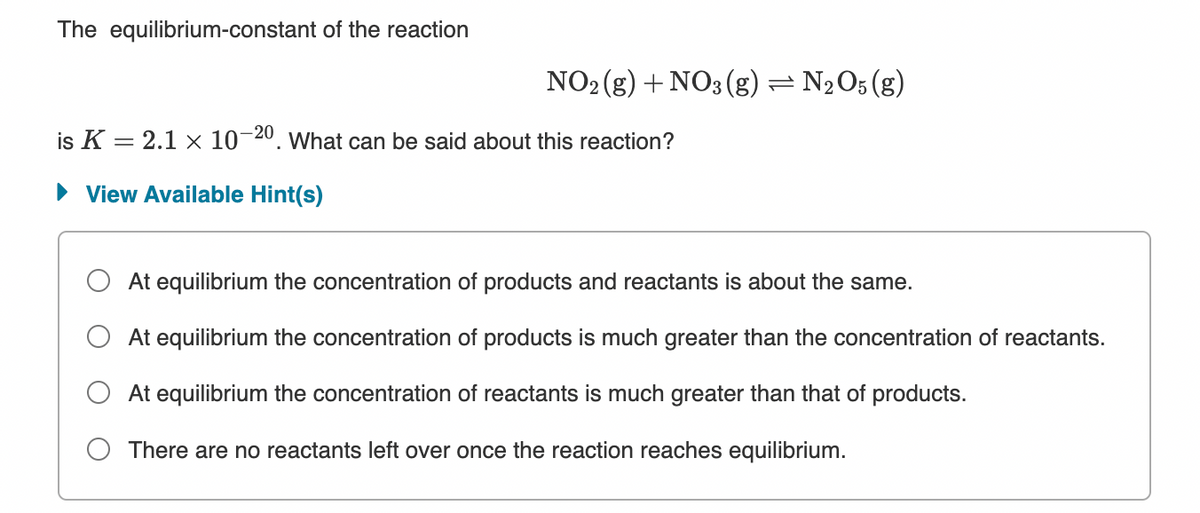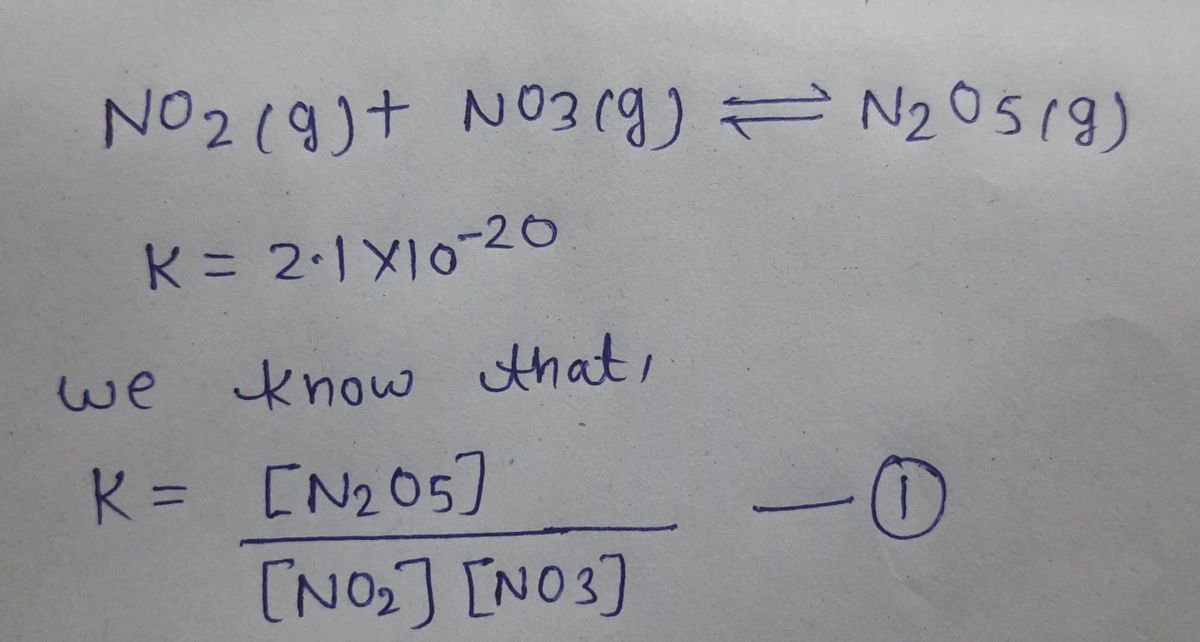The equilibrium-constant of the reaction NO2 (g) + NO3(g) - N2O5 (g) is K = 2.1 x 10–20. What can be said about this reaction? • View Available Hint(s) At equilibrium the concentration of products and reactants is about the same. At equilibrium the concentration of products is much greater than the concentration of reactants. At equilibrium the concentration of reactants is much greater than that of products. There are no reactants left over once the reaction reaches equilibrium.
The equilibrium-constant of the reaction NO2 (g) + NO3(g) - N2O5 (g) is K = 2.1 x 10–20. What can be said about this reaction? • View Available Hint(s) At equilibrium the concentration of products and reactants is about the same. At equilibrium the concentration of products is much greater than the concentration of reactants. At equilibrium the concentration of reactants is much greater than that of products. There are no reactants left over once the reaction reaches equilibrium.
World of Chemistry, 3rd edition
3rd Edition
ISBN:9781133109655
Author:Steven S. Zumdahl, Susan L. Zumdahl, Donald J. DeCoste
Publisher:Steven S. Zumdahl, Susan L. Zumdahl, Donald J. DeCoste
Chapter17: Equilibrium
Section: Chapter Questions
Problem 39A
Related questions
Question

Transcribed Image Text:The equilibrium-constant of the reaction
NO2 (g) + NO3(g) = N2O5 (g)
is K = 2.1 x 10-20. What can be said about this reaction?
• View Available Hint(s)
At equilibrium the concentration of products and reactants is about the same.
At equilibrium the concentration of products is much greater than the concentration of reactants.
At equilibrium the concentration of reactants is much greater than that of products.
O There are no reactants left over once the reaction reaches equilibrium.
Expert Solution
Step 1

Trending now
This is a popular solution!
Step by step
Solved in 2 steps with 2 images

Knowledge Booster
Learn more about
Need a deep-dive on the concept behind this application? Look no further. Learn more about this topic, chemistry and related others by exploring similar questions and additional content below.Recommended textbooks for you

World of Chemistry, 3rd edition
Chemistry
ISBN:
9781133109655
Author:
Steven S. Zumdahl, Susan L. Zumdahl, Donald J. DeCoste
Publisher:
Brooks / Cole / Cengage Learning

Chemistry: The Molecular Science
Chemistry
ISBN:
9781285199047
Author:
John W. Moore, Conrad L. Stanitski
Publisher:
Cengage Learning


World of Chemistry, 3rd edition
Chemistry
ISBN:
9781133109655
Author:
Steven S. Zumdahl, Susan L. Zumdahl, Donald J. DeCoste
Publisher:
Brooks / Cole / Cengage Learning

Chemistry: The Molecular Science
Chemistry
ISBN:
9781285199047
Author:
John W. Moore, Conrad L. Stanitski
Publisher:
Cengage Learning


Chemistry
Chemistry
ISBN:
9781305957404
Author:
Steven S. Zumdahl, Susan A. Zumdahl, Donald J. DeCoste
Publisher:
Cengage Learning

Chemistry: An Atoms First Approach
Chemistry
ISBN:
9781305079243
Author:
Steven S. Zumdahl, Susan A. Zumdahl
Publisher:
Cengage Learning

Chemistry & Chemical Reactivity
Chemistry
ISBN:
9781337399074
Author:
John C. Kotz, Paul M. Treichel, John Townsend, David Treichel
Publisher:
Cengage Learning